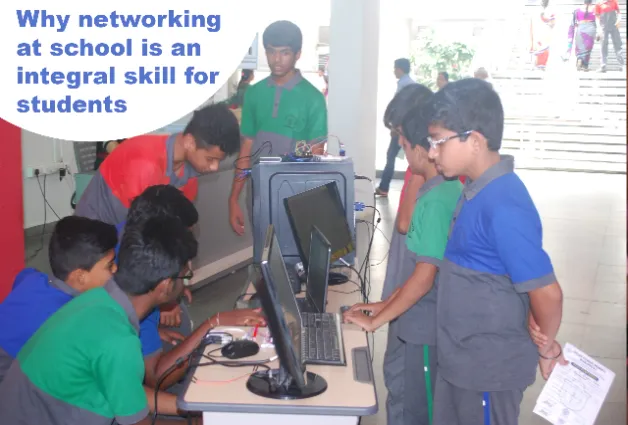“Your network is your net worth.” — Porter Gale
This is an often-quoted aphorism that carries a lot of wisdom in it. Many people don’t realise the role their networks play in their lives. Whether it’s about receiving references about a doctor, a new brand, or even a job opening –often some of the best things in life happen because someone in our network tells us about it. Networking during school and childhood typically happens with our peers. But networking to aid your professional development, and growth is a skill that has to be honed. It plays a critical role not just in moving forward when it comes to a career, but even in our personal lives.
The earlier a student can learn this skill, the more skilled they become at carrying themselves and serving their communities.
Whether it be through clubs and extracurricular activities, internships and work experience, or simply forming relationships with peers and teachers, the benefits of networking and building connections at school cannot be overstated. In this article, we will explore eight of the most important reasons why networking and building connections are essential for success in both the short and long term.
-
Career opportunities
One of the most common motivations for networking are the benefits and opportunities for career advancement. By building connections with peers, teachers, and professionals and even finding mentors in your chosen field, you may be able to secure internships or job offers that would otherwise be unavailable to you. Furthermore, these connections can serve as valuable references or mentors as you navigate the job market.
-
Personal development
By interacting with a diverse group of individuals, you learn new perspectives, hone your communication skills, and gain an incisive understanding of yourself and your values. By meeting people from different backgrounds, networking enables you to question your worldviews, and awareness of different subjects. When you have a wide and varied network, you can lean on them for support or guidance. Equally, by offering the same support to others, one learns the value of contributing to another’s life and empathy.
-
Access to information
One of the bigger benefits of this skill at later stages of life is access to information and resources that normally are confidential, or unknown to others, outside the networks. For example, if you are interested in a specific field, connecting with professionals in that field can provide you with valuable insights, dos and don’ts, and advice on approaching others in the industry, if not receiving direct introductions. Networking with peers can also provide you with access to information about internships, and full-time job opportunities that would typically be inaccessible without a network of people to endorse you.
-
Opportunities for collaboration
Whether it be working on a group project or starting a club or organisation, collaborating with others can help you develop and improve your leadership capabilities. While working on an area of interest is definitely exciting, it’s equally rewarding to work with others who can help you improve by providing feedback about your awareness, and knowledge of the subject itself.
-
Building a professional reputation
Many successful professionals credit their school life and college life as the starting point for developing their personalities. Participating in clubs, and activities which are competitive in nature helps students build a reputation for themselves. Often, with a reputation that precedes the name, people within the network are more than happy to make recommendations for a variety of opportunities since there’s a proven record of your capabilities. This could be within specific clubs or even in an area of your interest.
-
Building a support system
By forming close relationships with peers, teachers, and professionals, you can create a network of individuals who can provide you with emotional and practical support in times of need. These networks typically extend to a life beyond school years. Additionally, by participating in clubs and organisations, you can find a community of like-minded individuals, that form lifelong camaraderie.




